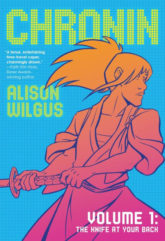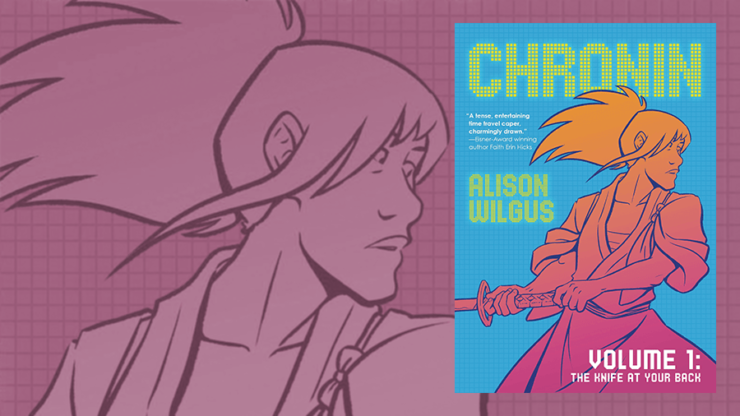When I heard of Chronin: The Knife At Your Back, the first in a time-travel graphic novel duology, I was intrigued. A comic set in 1864 Japan, featuring a time-travelling female college student from our future, disguised as a male samurai and stuck in the past? Sounds interesting!
Wilgus has written for animated television and for the Avatar: The Last Airbender comics, as well as having two works of graphic non-fiction to her credit. Where those other works were illustrated in collaboration with others, Chronin is written and illustrated by Wilgus alone. The art is black and white, the panels in a style somewhat reminiscent of the handful of manga I’ve read. (That being mostly Claymore. I fear I lack basis for adequate comparison.) The lines are clean: Wilgus is at her best with city scenes, architecture, and the countryside. Distinguishing faces, however, is not her greatest talent: Were it not for the stylised hair (pointy vs. round), it would be the next best thing to impossible for me to tell the two initial main characters apart, and even so, it remains difficult at times. Other characters fare less well in the recognition stakes, unless they’re wearing some distinguishing item of clothing.
I should make a couple of things clear up front. I read a fairly narrow array of comics and graphic novels, so while I know what I like, I don’t necessarily know how it relates to the rest of its field. And my review copy of Chronin: The Knife At Your Back came as a PDF, which makes reading narratives across multi-page panels rather trickier than is ideal. My initial reaction to Chronin: The Knife At Your Back wasn’t entirely positive—in part, I suspect, because I found it slow to start and confusingly laid out. On reflection, the confusion of the layout is most likely an artefact of my mode of reading, but I believe that “slow to start” is a fair reaction.
Yoshida Mirai is a college student from the future trapped in 1864 Japan, due to an attack on her and her fellow students. She’s masquerading as a male samurai—albeit badly—and the female owner of a tea shop hires her as a bodyguard for a journey. The comic opens with the tea shop owner trying to hire “Mr. Yoshida,” and while the reader may feel that something’s off about Yoshida and “his” reactions, we don’t learn the truth until the tea shop owner (a) unmasks Mirai as a woman, and (b) Mirai and the tea shop owner encounter Mirai’s ex-boyfriend, now the tea shop owner’s current boyfriend, who voluntarily stranded himself in the past in order to be part of the rebellion against the Tokugawa shogunate.
The pace picks up from there. Mirai is desperate to get home to the future, but it becomes increasingly clear that something’s gone horribly wrong with history. Events aren’t unfolding as they should. Leaders of the revolution have been executed. Edo doesn’t burn on schedule. If Mirai’s ever going to get home—and if Japan is to experience the Meiji Restoration that led to the creation of a constitutional monarchy rather than an absolutist one—she’s going to have to do something.
Buy the Book


Chronin Volume 1: The Knife At Your Back
There’s one element in this that rather broke me. Apparently undergraduate students are time-travelling as part of their coursework. My suspension of disbelief took a deep hit. Of course things go horribly wrong: As a former PhD student, I’m very much aware that you can’t even take undergraduates on a study tour of safe European historical sites without needing an emergency plan, because people do the wildest things when they’ve just hit legal drinking age and are away from their parents in an environment where the personal consequences aren’t immediately obvious. (I’d like to see a university’s risk assessment paperwork for that particular course. As long as I didn’t have to fill out any incident reports.)
Readers with a greater familiarity with this period in Japanese history and with society in feudal Japan may find more nuance and complexity (and commentary) in Chronin: The Knife At Your Back as a work of historical (science) fiction. Alas, my own familiarity is barely a passing one, limited to the broadest outlines, but The Knife At Your Back filled in a few details. I look forward to seeing what Wilgus does in the second volume.
Though I believe I’ll wait until I don’t have to read it as a PDF.
Chronin: The Knife at Your Back by Alison Wilgus is available from Tor Books
Liz Bourke is a cranky queer person who reads books. She holds a Ph.D in Classics from Trinity College, Dublin. Her first book, Sleeping With Monsters, a collection of reviews and criticism, was published in 2017 by Aqueduct Press. It was a finalist for the 2018 Locus Awards and was nominated for a 2018 Hugo Award in Best Related Work. Find her at her blog, where she’s been known to talk about even more books thanks to her Patreon supporters. Or find her at her Twitter. She supports the work of the Irish Refugee Council, the Transgender Equality Network Ireland, and the Abortion Rights Campaign.










